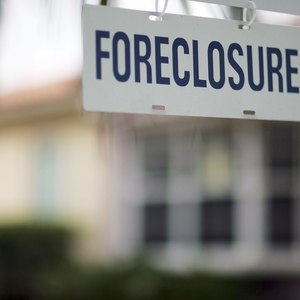
Many buyers mistakenly think that HUD homes and foreclosures are the same thing, but they're not. A HUD home is a residence owned and put on the market by the U.S. Department of Housing and Urban Development. A foreclosure can be any home owned by a bank, lender or government agency. When it comes to the buying process, there are significant differences between HUD-owned homes and other foreclosure properties.
The Foreclosure Process
If borrowers stop making their monthly mortgage payments, they'll eventually end up in foreclosure. The type of foreclosure, though, depends on the borrower's mortgage loan. When borrowers with a conventional loan -- a loan not insured by an agency of the federal government -- stop making their payments, their bank or lender will handle the foreclosure, eventually taking over ownership of the property. This is a traditional foreclosure. When borrowers have a mortgage insured by HUD's Federal Housing Administration -- commonly known as an FHA loan -- HUD itself takes over the property in a foreclosure. These are what are commonly called HUD homes.
Finding Them
Buyers find HUD homes and other foreclosed properties in different ways. Finding a HUD-owned home is simple. Buyers simply search for them on HUD's web site. Buyers can search homes by state, county, city, address or zip code. They can specify a price range and refine their searches by the number of bedrooms or bathrooms they want. Finding a traditional foreclosure is trickier. Buyers can use the advanced search option on Realtor.com to find foreclosed homes across the country. They can also search the web sites of individual banks or lenders to search their stock of foreclosed properties. Finally, buyers can work with a real estate agent to find traditional or HUD foreclosures in their communities.
Prices
Buyers might believe that they can get HUD or foreclosed homes for $1, but that's a myth. Both HUD homes and foreclosures are priced closer to market-value homes than many buyers think. According to online foreclosure company RealtyTrac, the average foreclosure property sold for $167,095 in the first quarter of 2013. RealtyTrac also reported that the average price of a property in foreclosure was just 30 percent lower than the average price of a traditional home during this period. Buyers, then, can realize savings by buying foreclosed or HUD homes. But they can't steal such a property.
Offers
Buying a traditional foreclosure differs little from purchasing any home. Once you find a foreclosure you want to purchase, you make an offer to the seller -- which, in this instance, will be a bank or lender. You can make this offer either on your own or through a real estate agent. Buying a HUD home is different. First, you can't make an offer on your own. Only a real estate agent representing you can make an offer on a HUD home. Second, HUD sells its homes through an online bidding system. Every HUD home will come with its own deadline, and HUD will only consider bids submitted before the deadline passes. HUD can reject all bids received during this period if none of them come in high enough.
As Is
One similarity between foreclosed and HUD properties is that they both often come in "as is" condition. This means that you'll be responsible for making any repairs to these properties, something that could make what looks like a bargain less affordable. Make sure to hire a home inspector before you officially purchase one of these homes. If the inspector finds serious problems, you can cancel your purchase offer.
References
Writer Bio
Don Rafner has been writing professionally since 1992, with work published in "The Washington Post," "Chicago Tribune," "Phoenix Magazine" and several trade magazines. He is also the managing editor of "Midwest Real Estate News." He specializes in writing about mortgage lending, personal finance, business and real-estate topics. He holds a Bachelor of Arts in journalism from the University of Illinois.

